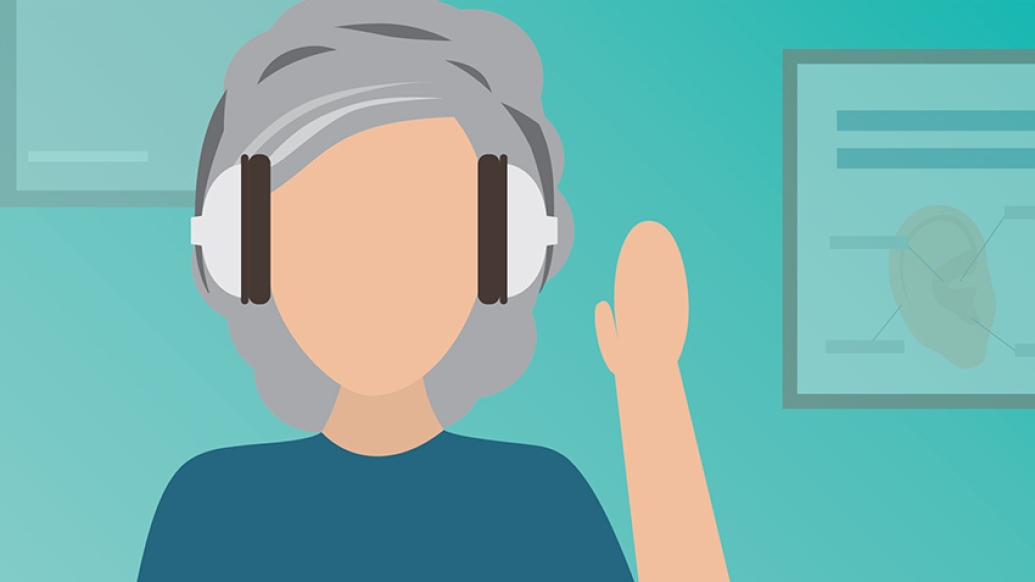National poll spotlights opportunity for primary care providers and hearing care specialists to work together to spot and treat hearing loss.
9:28 PM
Author |

Eighty percent of Americans over 50 say their primary care doctor hasn't asked about their hearing in the past two years, and nearly as many haven't had their hearing checked by a professional in that same time, according to a new national poll report.
That's despite a growing body of evidence about the importance of hearing to other aspects of life, from dementia and risk of falls to the ability to stay connected to friends and family.
Men were more likely than women to say they'd had a recent hearing screening or test, and so were people ages 65 to 80 compared with those in their pre-Medicare years, according to the findings from the National Poll on Healthy Aging, based at the University of Michigan's Institute for Healthcare Policy and Innovation. But even among men and those over 65, 72% hadn't been tested.
Older adults who said they were in fair or poor physical or mental health overall were less likely to have had their hearing tested in the past two years. This was despite the fact that they were more likely to experience hearing issues.
In all, 16% of the older adults polled said they had fair or poor hearing ability. But the percentage who reported they had fair or poor hearing rose to 28% among those who called their physical health fair or poor, and 31% among those who rated their mental health fair or poor.
Like Podcasts? Add the Michigan Medicine News Break on iTunes, Google Podcast or anywhere you listen to podcasts.
"Hearing loss can occur throughout life, but the risk rises with age as our ears lose function. Many people don't realize they've lost hearing ability unless they're screened or tested," says Michael McKee, M.D., M.P.H., a family medicine physician and health services researcher at Michigan Medicine, U-M's academic medical center. "Age-related hearing loss can have wide-ranging consequences, and can be addressed with assistive technologies, yet these data show a major gap in detection, and disparities between groups."
McKee, and Department of Family Medicine chair Philip Zazove, M.D., who both use cochlear implants, worked with the poll team to develop the questions and analyze the results contained in the new poll report.
SEE ALSO: Hearing Aids Linked to Lower Risk of Dementia, Depression and Falls, Study Finds
The poll receives support from AARP and Michigan Medicine, and draws from the answers of a national sample of more than 2,000 adults aged 50 to 80.
Barriers to care
In all, 6% of older adults said they currently use a device to aid their hearing, even though numerous studies show that at least 50% of older adults probably have some degree of hearing loss.
Zazove notes that health insurance plans vary widely in their coverage of hearing screening by primary care providers, hearing tests by audiologists and purchase of hearing aids and cochlear implants.
Age-related hearing loss can have wide-ranging consequences, and can be addressed with assistive technologies, yet these data show a major gap in detection, and disparities between groups.Michael McKee, M.D., M.P.H.
"Having to bear the cost of testing and devices can be a barrier to timely care, on top of the social stigma attached to age-related hearing loss and wearing a device," he says. "These findings spotlight a tremendous opportunity for primary care and audiology clinicians to partner better, and for health policy decisionmakers to engage on this issue."
Traditional Medicare does not cover routine hearing tests or devices, though it encourages primary care providers to use standard questionnaires about hearing during annual wellness visits. Medicare Advantage plans and employer-based insurance plans may cover some hearing-related services, while Medicaid coverage varies by state, and Veterans Health coverage is mainly for hearing issues connected to military service.
Despite the fact that most of them had not been screened or tested for hearing loss recently, 62% of the older adults polled felt it's somewhat or very important to have such tests every two years.
Policy implications
"These poll results are especially timely given the U.S. Food and Drug Administration's expected regulations regarding over-the-counter hearing aids, which could improve access but also make screening and testing more important for those who might seek to buy their own device without a prescription," says Preeti Malani, M.D., the director of the NPHA, who has training in geriatrics as well as infectious disease and is a physician at Michigan Medicine.
Congress directed the FDA to develop regulations for OTC hearing aids in 2017, and they were due to be unveiled in August 2020 but were delayed due to the COVID-19 pandemic.
SEE ALSO: Cost, Coverage and More Drive Hearing Aid Inequality
"A person's ability to hear greatly affects how they interact with other people, loved ones, and the environment around them," says Alison Bryant, Ph.D., senior vice president of research for AARP. "It's discouraging to learn that the majority of adults over 50 are not getting their hearing tested regularly, and may not know that their hearing is declining."
AARP has advocated for the FDA to publish regulations on over-the counter hearing aids, and offers information and resources about hearing loss online.
The National Poll on Healthy Aging results are based on responses from a nationally representative sample of 2,074 adults aged 50 to 80 who answered a wide range of questions online in June 2020. Questions were written, and data interpreted and compiled, by the IHPI team. Laptops and Internet access were provided to poll respondents who did not already have them.
Read the full report of the findings and methodology, along with past National Poll on Healthy Aging reports.

Explore a variety of health care news & stories by visiting the Health Lab home page for more articles.

Department of Communication at Michigan Medicine
Want top health & research news weekly? Sign up for Health Lab’s newsletters today!





